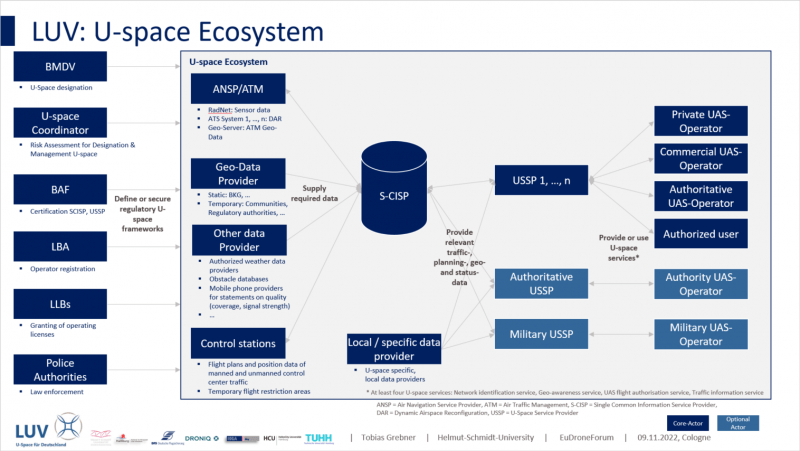To support the implementation of U-space in Germany, a project consortium made up of representatives from public authorities, research and industry is concentrating its expertise in the joint project LUV: “Lösungen und Handlungsempfehlungen für die nationale Umsetzung der U-Space-Verordnung”; in English: Solutions and recommendations for action to implement the U-space regulation in national law.
LUV is funded by the German Federal Ministry of Digital Affairs and Transport (BMDV) for 15 months with approximately 870,000 euros.
The objective of LUV is to develop recommendations for action for the national implementation of the U-space regulation (DVO (EU) 2021/664), taking into account technical, legal and organisational contexts. Within this framework, cornerstones for necessary adaptations in German air law are to be developed and further recommendations for action are to be made, among other things, for the design of roles, responsibilities and requirements for the technical equipment of air traffic participants.
To achieve the project objectives, a U-space operational concept will first be developed, which envisages that one Single Common Information Service Provider (SCISP) and several U-space Service Providers (USSP) will operate in the U-space airspace. The SCISP provides the USSPs with all relevant airspace data for the provision of U-space services. The USSPs in turn provide the services defined for a U-space (U-space services).
Based on this, process models for the technical and operational implementation of U-space airspaces are elaborated in order to develop suitable pricing concepts for SCISP and USSP. This will be followed by a validation of the results with the help of simulation studies. Together with an elaboration on the promotion of acceptance, the results will be used to develop recommendations for action.
The LUV consortium
The lead manager of the project is the Helmut Schmidt University/University of the Federal Armed Forces in Hamburg. Other universities involved in LUV are the Hamburg University of Technology (TUHH) and HafenCity University Hamburg (HCU). Corporate partners of the project are, HHLA Sky, Droniq and the German air navigation service provider DFS (Deutsche Flugsicherung). The Hamburg Ministry of Economics and Innovation (BWI) is also a partner.
Background
Unmanned aircraft systems (UAS), more commonly referred to as drones, hold enormous economic potential by adding additional means of transportation to multimodal mobility. At the same time, the exploitation of this potential requires the assurance of safe and efficient airspace access for UAS and thus a reliable legal framework and innovative technologies that ensure the integration of UAS into the airspace and the existing airspace structures. The European Commission has recognized the need for technical infrastructure and on April 22, 2021, adopted the Implementing Regulation (EU) 2021/664 on the legal framework of a U-space (U-Space Regulation). U-space is understood to be a concept for drone traffic management that realizes airspace management in a defined geographical area, the U-space airspace.
With the adoption of the U-space Regulation with immediate effect from 26.01.2023, the EU has created the legal groundwork for the establishment of U-space airspaces. In these geographical zones, UAS operators should be enabled to use UAS safely and efficiently by making use of U-space services. The implementation of the U-space concept including the design of the processes, the actors and responsibilities according to the U-space Regulation is a task of the individual Member States.
For more information:




